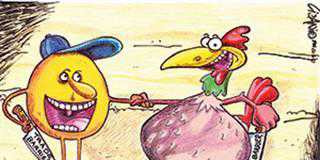It seems inconceivable that there should ever be a debate over whether agriculture is a national asset or liability. Surely any rational person would consider it logical that, in virtually any country, agriculture should form the basis of the economy.
Yet in Africa it can never be assumed that this is the thinking.
Agricultural ideology
South Africa can only flourish if agriculture is in a healthy state. Unfortunately, there is great ignorance about the perceived role that agriculture should play in the national economy and what is required to ensure a vibrant rural economy.
Food security as a crucial strategic asset does not receive the attention it deserves. Why is it that South African farmers are held in high esteem all over the world while in their own country they are chastised by well-fed critics who do not realise that they are killing the goose that lays the golden egg?
The battle to make economic “freedom” a reality is in full swing. With its utterances and actions, the ANC emphasises the necessity of distributing wealth.
The government does not seem to realise that before the cake can be served, somebody is required to bake it. And this requires creativity, hard work and the freedom to make future-driven decisions.
In South Africa, the attempt to create a healthy agricultural balance sheet has unfortunately developed to such an extent that government and farmers are at loggerheads. While the former focuses ideologically on influencing the agricultural balance sheet, the latter are doing their best to sustain production, notwithstanding the animosity of government.
It is important to distinguish between the approaches of government and farmers. One of the most important considerations is that the balance sheet is the result of economic decisions. Political decisions should contribute to creating a climate within which entrepreneurs can function.
A restrictive environment
The economic dilemma is locked within a unique African outlook on life and the world. In South Africa, the government is making decisions which will result in the same decay that typifies the rest of Africa.
To enact its ideology, the ANC is implementing laws that contain the poison in the potion. While it desires the dividends of Western achievements, it adopts laws and regulations that make it impossible for the Western approach to function and succeed.
This, in fact, creates a cancerous entity within the economy that will inevitably have a negative impact on investors’ confidence.
The following serve as examples:
- The utterances by a few irresponsible hotheads regarding the nationalisation of assets. The ANC leadership is reluctant to nip this problem in the bud. In fact, it handles it in such a way as to create uncertainty and doubt.
- Labour and related legislation. International role players are asking whether any entrepreneur would be willing to consider expanding employment, considering the risks of current legislation.
- The Mineral and Petroleum Resources Act and its impact on agriculture. The right to mine minerals is regarded as superseding private property rights. After a mine closes, for example, the environment is often damaged to such an extent that rehabilitation and food production is impossible. Such mining activities also create safety and security problems for rural communities.
- The fact that research has almost ground to a halt. While South Africa used to be considered a world leader in research at Onderstepoort and the Agricultural Research Council, current activity at these institutions is not held in high regard. Has the price of affirmative action become too high to pay?
- The handling of the land issue. Unrealistic expectations, that cannot be fulfilled are continually created and this causes tension. Farmers did not steal the land they occupy and have, through the passing of time, contributed constructively to the economy of the country. The lie about the history of land ownership is repeated so often that the world is starting to believe it.
Productive farmers
The balance sheet of government creates uncertainty, and, when measured against the international food security crisis, does not make the grade. In comparison, the balance sheet of commercial agriculture reflects a sector striving to achieve optimal production.
It makes a constructive contribution to produce food for the hungry millions – including the masses of people crossing our borders from the north. Job opportunities are sustained and the rural economy is supported – and this contributes to stability.
In both Egypt and Mozambique the occurrence of “hunger protests” serves as a warning of what could happen in South Africa if more land transferred for restitution becomes unproductive.
In its farmers, South Africa has some of the best agricultural expertise in the world, and international demand for it is high.
Productive farmers remain one of the most important assets available to any country. Our farmers have proved that they can make a positive contribution to the national balance sheet.
The ANC government should realise that it will need to have answers for the hungry masses should the current trend to place food security at risk continue. Reasons will have to found, for example, to explain why productive land has become unproductive.
Security concerns
The creation of a safe and secure rural environment that makes it possible for people to make a contribution starts with the political will of the government. The question may well be posed whether government has the will to improve the current situation.
Fuzzy irrelevant statements on crime are sometimes heard but very little is done in practice. Those dedicated SA Police Service members who are doing their best to improve the situation deserve our appreciation, but unfortunately many SAPS officers have become part of the problem.
The responsibility to correct this state of affairs rests squarely on the shoulders of government. As farmers, we long for the day when we can rather discuss ways to improve productivity in agriculture. However, politics is forced upon those involved in agriculture and we have no option but to bring these matters out into the open in an effort to protect farmers against an unexpected political tsunami.
Contact Ben Marais on 012 804 8031 or visit the TAU website: www.tlu.co.za.
The views expressed in our weekly opinion piece do not necessarily reflect those of Farmer’s Weekly.













